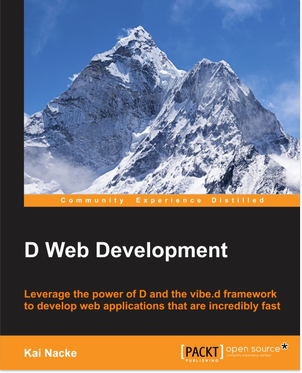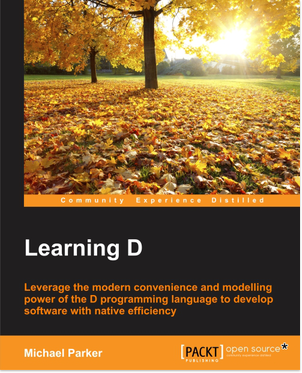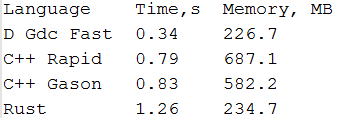The digest of events from the world D №2
Recently, there have been many publications on Hubré on the topic of Rust and Go and quite a few about D. The main reason for this is the support of these Mozilla and Google languages, which can invest a lot of money in their offspring. There is no such large company behind D, however, this does not prevent the language from actively developing. Now I will briefly talk about the latest news of the language and leave it to someone else to conduct a comprehensive comparison of Rust / Go and D.
1. First and foremost. D was finally converted from C ++ to D. It is an extremely significant event. This was not only an important step in the development of an integrated infrastructure, but also made it possible to significantly simplify the development process, since not all people interested in developing D know C ++. It should be noted that there was not a simple rewriting of the code, but a semi-automatic conversion of the entire DMD codebase with C ++. And this is tens of thousands of lines of code (yes DMD is not small). About how everything went, you can see on this video:
2. D is actively moving towards facilitating integration with C ++ code, which should simplify the transition of C ++ programmers to D. At this point, D is the only language that can provide almost seamless integration with existing C ++ code. Neither Rust nor Go can afford it. The movement goes both from the official DMD compiler and from third-party LLVM-based compilers. So it is reported that Walter Bright, in combination the author of the first C ++ compiler (working without intermediate translation in C) is actively working to support the handling of C ++ exceptions in D.
')
Integration with C ++ code is actively promoted by the Calypso project, the first public release of which should take place very soon. So far, a test build is available for Linux users, which allows you to build even such complex libraries as Qt5 and Ogre3D. The build for Windows will be available with the first public release. So we are waiting.
In general, the development plan for Calypso is as follows:
Improved support for C ++ exceptions -> improved support for C ++ 11 -> support for MSVC -> improved magicport2 (tool for translating C ++ code to D) -> full Calypso brushing (to not write binders for Clang) -> Calypso as a library for LLVM / Clang.
3. Actively working on the support of mobile platforms. At the moment, it is reported that the runtime language and the Phobos library pass almost all tests on Android devices. We can’t talk about full development support for iOS yet, but thanks to the efforts of the LDC-iphone project, you can write simple D - applications under iOS.
The same goes for the main compiler DMD, which in the latest version received basic support for Obj-C .
If everything goes at such a pace, then in the coming years, D will discover a huge niche of mobile devices, which should have a beneficial effect on its popularity.
4. The non-profit organization D Language Foundation was created. The mission is to contribute to the development of the community D. The foundation is responsible for various processes within the community D, including the development of the DMD reference compilation, intellectual property rights management, organization of developer conferences, including DConf, and fundraising
5. After long maintenance work, he returned to dlang.ru life .
6. The vibed web framework changed several versions and continued the course of increasing modularity.
7. Several books on D programming are being prepared for publication.
D Web Development

Learning d

A few months ago a wonderful book by Ali Çehreli “Programming in D” was published in paper form. I'd add that I strongly recommend this book. Its free version can be found here .
8. D fastest Json parser in the world was written on D, which almost doubled the fastest implementation of C ++ parser Json parser.

9. Released a full binning to the library of graphical applications SFML .
10. Updated binding to Qt / QML DOtherSide
1. First and foremost. D was finally converted from C ++ to D. It is an extremely significant event. This was not only an important step in the development of an integrated infrastructure, but also made it possible to significantly simplify the development process, since not all people interested in developing D know C ++. It should be noted that there was not a simple rewriting of the code, but a semi-automatic conversion of the entire DMD codebase with C ++. And this is tens of thousands of lines of code (yes DMD is not small). About how everything went, you can see on this video:
2. D is actively moving towards facilitating integration with C ++ code, which should simplify the transition of C ++ programmers to D. At this point, D is the only language that can provide almost seamless integration with existing C ++ code. Neither Rust nor Go can afford it. The movement goes both from the official DMD compiler and from third-party LLVM-based compilers. So it is reported that Walter Bright, in combination the author of the first C ++ compiler (working without intermediate translation in C) is actively working to support the handling of C ++ exceptions in D.
')
Integration with C ++ code is actively promoted by the Calypso project, the first public release of which should take place very soon. So far, a test build is available for Linux users, which allows you to build even such complex libraries as Qt5 and Ogre3D. The build for Windows will be available with the first public release. So we are waiting.
In general, the development plan for Calypso is as follows:
Improved support for C ++ exceptions -> improved support for C ++ 11 -> support for MSVC -> improved magicport2 (tool for translating C ++ code to D) -> full Calypso brushing (to not write binders for Clang) -> Calypso as a library for LLVM / Clang.
3. Actively working on the support of mobile platforms. At the moment, it is reported that the runtime language and the Phobos library pass almost all tests on Android devices. We can’t talk about full development support for iOS yet, but thanks to the efforts of the LDC-iphone project, you can write simple D - applications under iOS.
The same goes for the main compiler DMD, which in the latest version received basic support for Obj-C .
If everything goes at such a pace, then in the coming years, D will discover a huge niche of mobile devices, which should have a beneficial effect on its popularity.
4. The non-profit organization D Language Foundation was created. The mission is to contribute to the development of the community D. The foundation is responsible for various processes within the community D, including the development of the DMD reference compilation, intellectual property rights management, organization of developer conferences, including DConf, and fundraising
5. After long maintenance work, he returned to dlang.ru life .
6. The vibed web framework changed several versions and continued the course of increasing modularity.
7. Several books on D programming are being prepared for publication.
D Web Development

Learning d

A few months ago a wonderful book by Ali Çehreli “Programming in D” was published in paper form. I'd add that I strongly recommend this book. Its free version can be found here .
8. D fastest Json parser in the world was written on D, which almost doubled the fastest implementation of C ++ parser Json parser.

9. Released a full binning to the library of graphical applications SFML .
10. Updated binding to Qt / QML DOtherSide
Source: https://habr.com/ru/post/270901/
All Articles